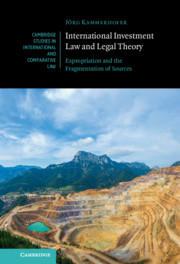Book contents
- International Investment Law and Legal Theory
- Cambridge Studies in International and Comparative Law: 158
- International Investment Law and Legal Theory
- Copyright page
- Dedication
- Contents
- Figures
- Preface
- Table of Cases
- 1 Introduction
- 2 Customary International Law
- 3 Investment Precedents
- 4 Treaty Interpretation
- 5 Doctrinal Scholarship
- 6 The Regulatory Expropriation Conundrum
- 7 Expropriation: A New Beginning
- 8 Expropriation Reconstructed
- Bibliography
- Index
- Cambridge Studies in International and Comparative Law
4 - Treaty Interpretation
Published online by Cambridge University Press: 17 April 2021
- International Investment Law and Legal Theory
- Cambridge Studies in International and Comparative Law: 158
- International Investment Law and Legal Theory
- Copyright page
- Dedication
- Contents
- Figures
- Preface
- Table of Cases
- 1 Introduction
- 2 Customary International Law
- 3 Investment Precedents
- 4 Treaty Interpretation
- 5 Doctrinal Scholarship
- 6 The Regulatory Expropriation Conundrum
- 7 Expropriation: A New Beginning
- 8 Expropriation Reconstructed
- Bibliography
- Index
- Cambridge Studies in International and Comparative Law
Summary
Does judicial interpretation of IIAs produce epistemic ‘authority’? Interpretation can mean both the process of finding out what texts mean and guidance to the concretisation of abstract general norms in individual instances. In the second sense, interpretation is subconsciously used to narrow the freedom of deciders; a range of interpretative tools is used to generate a quasi-formal unity of meaning across IIAs. Systemic integration is the most used and most potent tool. It enjoins us to assume that meanings are identical, but this is baseless: taking into account external rules could just as easily be the basis for a divergence. However, customary law is less certain and precise than assumed. From the perspective of peer-accepted reasoning-before-decision, the interpreter takes meanings, not external rules, into account. Arbitral tribunals in fact interpret IIAs in light not of a customary norm but of other investment tribunals’ understanding of the meaning of other treaty norms. On that perspective, there is no distinction between interpretative tools. Interpretation cannot unify investment law because it does not change the law, only certain brute facts.
Keywords
- Type
- Chapter
- Information
- International Investment Law and Legal TheoryExpropriation and the Fragmentation of Sources, pp. 68 - 143Publisher: Cambridge University PressPrint publication year: 2021

